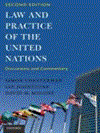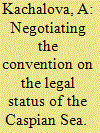|
|
|
Sort Order |
|
|
|
Items / Page
|
|
|
|
|
|
|
| Srl | Item |
| 1 |
ID:
141026


|
|
|
| 2 |
ID:
189177


|
|
|
|
|
| Summary/Abstract |
INTEGRATION processes that are actively unfolding in the modern world cover a variety of areas of state activity. The most important role in stimulating these processes is played by international organizations, which act not only as an organizing principle, but also in a certain territorial form, facilitating the unification of the economic, political, and cultural potential of member states. One such interstate formation, widely known in the world and the most advanced in terms of integration, is the European Union (EU).
|
|
|
|
|
|
|
|
|
|
|
|
|
|
|
|
| 3 |
ID:
145033


|
|
|
|
|
| Edition |
2nd ed.
|
| Publication |
New Delhi, Oxford University Press, 2016.
|
| Description |
xliii, 741p.pbk
|
| Standard Number |
9780199399499
|
|
|
|
|
|
|
|
|
|
|
|
Copies: C:1/I:0,R:0,Q:0
Circulation
| Accession# | Call# | Current Location | Status | Policy | Location |
| 058661 | 341.23/CHE 058661 | Main | On Shelf | General | |
|
|
|
|
| 4 |
ID:
088190


|
|
|
| 5 |
ID:
090134


|
|
|
|
|
| Publication |
2009.
|
| Summary/Abstract |
For Kant and many modern cosmopolitans, establishing the rule of law provides the chief mechanism for achieving a just global order. Yet, as Hart and Rawls have argued, the rule of law, as it is commonly understood, is quite consistent with "great iniquities." This criticism does not apply to a sufficiently robust, republican conception of the rule of law, which attributes a basic legal status to all persons. Accordingly, the pervasiveness of dominated persons without legal status is a a fundamental violation of the rule of law. This legal status can be understood in Kant's sense as an original "right to freedom," one that is not derived from or acquired by membership in a community or from citizenship. The realization of this kind of legal status can already be found in the "cosmopolitan constitutions" of many democracies, which include rights of persons (and not just citizens) to habeas corpus and other statuses that protect those vulnerable to domination. In order that all persons have the appropriate institutional space within which to exercise the powers of persons to address and make claims, institutions such as human rights courts to which those who lack legal status can appeal and be recognized are necessary for a form of the rule of law that is adequate to current circumstances.
|
|
|
|
|
|
|
|
|
|
|
|
|
|
|
|
| 6 |
ID:
085835


|
|
|
|
|
| Publication |
2008.
|
| Summary/Abstract |
As early as the 18th-19th centuries, the political disagreements among Great Britain, Russia, and Turkey over the Caspian Sea region brought about significant changes in its diplomatic reality. After World War I and II, the policy of the great powers also changed the diplomatic landscape of this region, which, despite all of the disputes, remained in the center of international attention. Control over the Caspian began to largely be viewed within the framework of the influence of the two main powers in the region: the Soviet Union and Persia.
|
|
|
|
|
|
|
|
|
|
|
|
|
|
|
|
| 7 |
ID:
169530


|
|
|
|
|
| Summary/Abstract |
THIS AUGUST will mark the first anniversary of the adoption of the Convention on the Legal Status of the Caspian Sea. The heads of the coastal states unanimously regarded the signing of the "Caspian Sea Constitution" at the Fifth Caspian Summit in Aktau on August 12, 2018. as a historic and extraordinary event. Russian President Vladimir Putin called it epochal. The completion of more than 20 years of negotiations on the main Caspian treaty, coupled with the signing of intergovernmental documents on cooperation in the fields of economy, transportation, incident prevention, combating organized crime, terrorism, and the work of border agencies, opened a new chapter in the history of the Caspian Five regional mechanism.
|
|
|
|
|
|
|
|
|
|
|
|
|
|
|
|
| 8 |
ID:
128702


|
|
|
|
|
| Publication |
2013.
|
| Summary/Abstract |
David Fisher's morality and war suggest that the torturing of terrorists to gain information which would prevent acts of terror should not be legalised. The author examines his argument.
|
|
|
|
|
|
|
|
|
|
|
|
|
|
|
|
| 9 |
ID:
149651


|
|
|
|
|
| Summary/Abstract |
There has been an attempt to redefine the meaning of sovereignty in international legal discourse in the post-Cold War era. This attempt was essentially necessitated by a series of high-profile instances (including Somalia, Bosnia, Rwanda, Kosovo, Darfur) in which the United Nations/international community was seen as doing too little or (occasionally) too much when faced with grave humanitarian emergencies. Accordingly, sovereignty, one of the foundational principles of international law, came to be interpreted as a two-way street conferring rights on States, while at the same time imposing a set of duties on them. This idea is couched in the doctrine of “Responsibility to Protect” (or as it has come to be known—R2P) which was formally endorsed at the UN World Summit 2005. The UN Security Council has invoked this doctrine numerous times in its resolutions over the years. Against this background, the central aim of this article is to examine the legal status of the doctrine of Responsibility to Protect under international law. While claiming that R2P is a new face of the old liberal doctrine of humanitarian intervention, the article will argue that R2P is neither a law nor a legally binding framework and that there are grave ambiguities in terms of its specific normative contents. It will demonstrate that R2P (at the very least its military aspects) does not enjoy consensus either in principle or in practice, and that its international legal implications are not immediately clear. From this analysis the article would conclude that R2P is yet to find its legal feet in the practice of States, particularly the Asian-African States and that if the international community is to take human suffering seriously and address it with timely and effective collective action, democratization of the Security Council should take place as a matter of urgent priority.
|
|
|
|
|
|
|
|
|
|
|
|
|
|
|
|
|
|
|
|
|